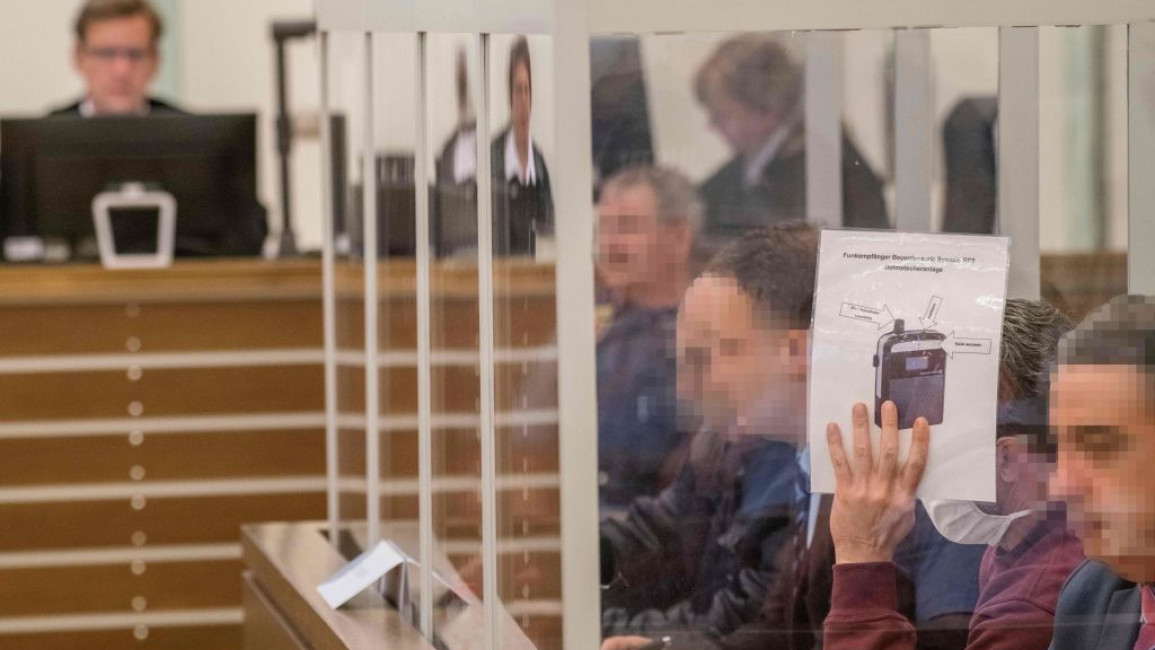German prosecutors seek life for former Syrian regime intelligence colonel in torture case
German prosecutors on Thursday called for life in prison for a former Syrian intelligence services colonel accused of crimes against humanity in the first trial worldwide over state-sponsored torture in Syria.
Anwar Raslan, 58, is accused of overseeing the murder of 58 people and the torture of 4,000 others at the Al-Khatib detention centre in Damascus between 29 April 2011 and 7 September 2012.
He sought refuge in Germany after deserting the Syrian regime in 2012.
Raslan was put on trial in April 2020 along with another lower-ranking defendant, Eyad Al-Gharib, accused of helping to arrest protesters and deliver them to Al-Khatib.
Al-Gharib was sentenced to four and a half years in prison in February for complicity in crimes against humanity, in the first verdict worldwide over torture by Syrian President Bashar Al-Assad's government.
The case against the two men was brought using the legal principle of universal jurisdiction, which allows offences to be prosecuted even if they were committed in a foreign country.
Other such cases have also sprung up in Germany, France and Sweden, as Syrians who have sought refuge in Europe turn to the only legal means currently available to them.
'Fists, wires and whips'
Besides the ongoing proceedings against Raslan, a case is under way in Germany against a former Syrian doctor who has been charged with crimes against humanity.
Raslan worked for 18 years in the Syrian intelligence services, where he rose through the ranks to become head of the domestic intelligence "investigation" service, according to a German investigator who testified at the opening of the trial.
Prosecutors say he oversaw rape and sexual abuse, "electric shocks", beatings with "fists, wires and whips" and "sleep deprivation" at the prison.
Since the opening of the trial, more than a dozen Syrian men and women now living across Europe have taken the stand to testify about the abuses they endured there.
They have reported flogging, electric shocks, cigarette burns and blows to the genitals. Some say they were hung by the wrists, with only the tips of their feet still touching the ground.
Images of dead Syrians smuggled out of the country by a photographer known as "Caesar" have also been used as evidence in the trial.
'Regret and compassion'
Raslan has repeatedly denied any responsibility, stating that he had "neither beaten nor tortured" prisoners and had "never acted inhumanely".
He said he "did not and would not condone" the abuses committed by the Syrian regime and felt "regret and compassion" for all the victims.
But Wolfgang Kaleck, secretary general of the German NGO European Center for Constitutional and Human Rights, which is supporting victims in the proceedings, said Raslan had issued orders in his department.
"We do not believe he played a minor role," Kaleck said.
Public prosecutor Jasper Klinge said at the opening of the trial that Raslan "knew the extent of the torture" which took place in order to extract "confessions and information about the (Syrian) opposition".
According to the UK-based Syrian Observatory for Human Rights monitoring group, at least 60,000 people have been killed under torture or as a result of the terrible conditions in Assad's detention centres.


![President Pezeshkian has denounced Israel's attacks on Lebanon [Getty]](/sites/default/files/styles/image_684x385/public/2173482924.jpeg?h=a5f2f23a&itok=q3evVtko)



 Follow the Middle East's top stories in English at The New Arab on Google News
Follow the Middle East's top stories in English at The New Arab on Google News


